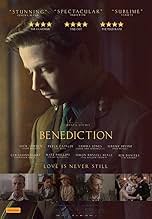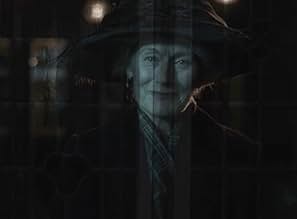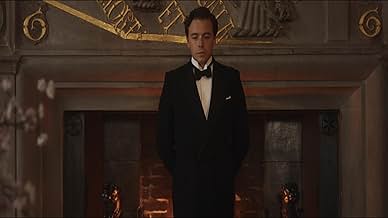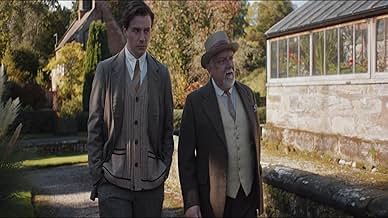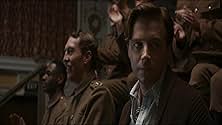Legendary 20th century English war poet Siegfried Sassoon embarks on a life-long quest for personal salvation through his experiences with family, war, his writing, and destructive relations... Read allLegendary 20th century English war poet Siegfried Sassoon embarks on a life-long quest for personal salvation through his experiences with family, war, his writing, and destructive relationships. True salvation can only come from within.Legendary 20th century English war poet Siegfried Sassoon embarks on a life-long quest for personal salvation through his experiences with family, war, his writing, and destructive relationships. True salvation can only come from within.
- Awards
- 9 wins & 19 nominations total
- Director
- Writer
- All cast & crew
- Production, box office & more at IMDbPro
Featured reviews
An anti-war biopic of Siegfried Sassoon
Siegfried Sassoon (Jack Lowden/Peter Capaldi) was a Second Lieutenant during World War I. His younger brother, Hamo (Thom Ashley), is killed during the war. Siegfried is further horrified by the tremendous human toll in death and lifelong disability caused by military leadership in which he no longer believes. Already a well-known poet, he refuses further participation in the war and is sent to the Craiglockhart War Hospital near Edinburgh technically for shell shock. There Siegfried meets and befriends Wilfred Owen (Matthew Tennyson), a much younger man. Siegfried also explicitly recognizes his own homosexuality.
The film then follows his anti-war sensibilities through snippets of his poetry and his chaotic love life, mainly focused on Ivor Novello (Jeremy Irvine) and Stephen Tennant (Calam Lynch/Anton Lesser). At a certain point, he tries to escape the chaos by marrying Hester Gatty (Kate Phillips/Gemma Jones). Together they have a son. George (Richard Goulding), but clearly, the marriage does not heal Sassoon's memories.
The film uses footage from the trenches in World War I and occasionally flips in time between the young Sassoon and the elderly Sassoon. Some of the editing decisions made little sense to me, particularly the early scene forecasting his conversion to Catholicism. Some edits made the film more complex than necessary. Nevertheless, the movie successfully portrays Sassoon as disabled because of World War I, from which he never psychologically recovered. This is clear from the multiple references to Wilfred Owens' poem, "Disabled."
indulgent languid catty
This long film is possibly better suited for TV viewing, so for UK viewers I expect to see it on BBC TV because BBC-Films was one of the funding sources. Despite that, I'm pleased to have seen it at the almost empty cinema if only for the better focus there with no distractions of home.
I liked this more than I was expecting, which possibly says more about me than the film.
It's a surprise to me that this film got made, especially in these pandemic times, as it is quite indulgent, languid and would appeal to a possibly limited segment of cinema goers.
It is not a biography of Sassoon, as there's no mention of his father, his father's early death, the bequest from his aunt, or Heytesbury, or his death etc.
Instead it is an absorbing slightly mesmeric collage of catty dialogue, music, poetry and grainy WW1 footage and still photography artfully assembled into a tale of searching for redemption and the angst for help to deal with the past, which presumably explains the title.
The initial early transition between actors (young Siegfried and old Siegfried) could have been better handled as at least one later transition of another character was clearly done. Peter Capaldi is fabulously haunted in the role of old Siegfried, though with a clipped accent to mask the rich Scottish tones underneath. The always watchable Geraldine James appears briefly as mother.
Jeremy Irvine is devilish as Ivor Novello. Calam Lynch is acidic as young Stephen Tennant. Jack Lowden is reasonable as young Siegfried.
The first of the song choices seemed anachronistic, as the backing for grainy WW-1 footage. But this is a minor detail.
Overall: best for TV maybe, 7/10.
Interesting but flawed
My Score 7/10
I always find something to enjoy in a Terence Davies film but often come away thinking that his screenplays and Direction tell us more about Terence Davies than they do about the subject of his story .
The subject in this movie is Siegfried Loraine Sassoon CBE who was born on September 8th 1886 . He was a famous English war poet, writer, and soldier who was decorated for bravery on the Western Front and became one of the leading poets of the First World War.
I was surprised to read that Terence Davies the writer and Director of Benediction has only made feature 24 films . Three of those are biographical and known as the Terence Davies Trilogy Distant Voices, Still Lives (1988), The Long Day Closes (1992) and the collage film Of Time and the City (2008) a nostalgic look at his birthplace city Liverpool U. K. In 2000 Terence Davies Directed and wrote the screenplay for his movie adaptation of The House of Mirth the 1905 novel by American author Edith Wharton.
After seeing Benediction Terence David's most recent movie I looked back on my previous review of his last feature film "A Quiet Passion " (2016) about the life of Emily Dickinson the famous American poet . I was interested to see that I felt similarly about that movie as do about "Benediction." a quote from my review- of A Quiet Passion ."
A bleak film written and directed by Terence Davies I thought though at times it's very beautiful that it would have been more balanced if he had shown less suffering and more of the joyful influences that inspired her poetry . I doubt her life was all despair and angst, perhaps it says more about Terence Davies than Emily Dickinson.
After seeing Benediction I read that Terence Davies has said I don't like being gay. It has ruined my life. I am celibate, although I think I would have been celibate even if I was straight because I'm not good-looking; why would anyone be interested in me? And nobody has been. Work was my substitute.
I think I understand all his films a little better after reading that as they all have a poetic undertone of sadness and regret while still at the same time especially in Benediction display the gift of panache and sophistication that many older Gay men ,especially in the film and television industry possess .
Benediction traces the life of the famous English poet Siegfried Sassoon CBE who was a brave and decorated First World War hero who won the Military Cross then left the Army and in 1917 .
Sassoon wrote his "Soldiers Declaration."in which he described the horrors of the trenches and satirised the pretensions of those responsible in his view that promoted a jingoistic-fuelled war.
This of course outraged the British Parliament and the Army Chiefs and resulted in Siegfried Sassoon being sent to a War Hospital in Edinburgh where he was treated for shell shock.
Jack Lowdon a Scottish actor who was so good in Dunkirk as an RAF fighter pilot is very impressive as the young and charming Siegfried Sassoon .
Siegfried has a number of affairs with male lovers including the famous and handsome actor composer Ivor Novello and later a very interesting affair with German Prince Philipp of Hesse which oddly is not mentioned in this story?
I wondered why after reading more about Siegfried's affairs that stated the two men exchanged love letters after meeting in Rome in 1922. The affair ended apparently due to Prince Phillipp of Hesse's promiscuity but in Sassoon's diary he wrote "I am the only one of P's regular succession of affairs " A biographical movie of course can't tell the whole story and we do get a glimpse of the elegant and sophisticated literary and art circles that Siegfried Sassoon and his friends frequented . However I found out much more about Siegfried Sassoon after seeing the movie Benediction than before.
The apparent sadness of Siegfried Sassoon's later life is portrayed by Peter Capaldi as the aged and bitter Siegfried who after marrying Hester Gatty in 1933 ( in reality 2O years his junior) rages at his son and friends this to me seemed at odds with his younger self. Perhaps I'm reading more into it but I wondered if Terence Davies was transferring some of his own regret about his own sexuality into the character by depicting a sad closeted existence?.
The elder Hester is played by the wonderful Gemma Jones and she also is a reflection of a sad marriage .
These facts about Siegfried Sassoon's last years depicted in Terence Davies film are at odds with the truth as Siegfried and Hester separated in 1945 after 12 years of marriage when Siegfried was unable to find a compromise between the "companionship " and solitude he craved.
Their son George Sassoon( 1936 -2006) became a scientist and linguist ,and author and was adored by Siegfried,who wrote several poems addressed to his son.
This information just made me think while this movie is well crafted and interesting that it's missing the true character of its subject Siegfried Sassoon.
Ignore the naysayers...this is a beautiful, deeply poetic, ethereal masterpiece...
All of the performances are 1st rate, the cinematography is exquisite, the production design is breath taking, and the dialogue is some of the best I've heard in a film in a very, very long time. Thanks to Mr. Terence Davies for making such an extraordinary movie.
Slow and Stately
The movie has serious Evelyn Waugh vibes, especially "Brideshead Revisited." WWI stories always fascinate me, especially when they're about how much the war screwed up the psyches of the people who were caught up in it. This film is overall satisfying, if a bit repetitive. A huge amount of time is spent on Sassoon, a more or less openly gay man, and his various love affairs, all with caricatures of flamboyant, bitchy gay men and all of them leaving you wondering what he wanted to be around them for in the first place. Seriously, were all gay men this hateful in the 1920s? But then you think about how marginalized they were, and the answer is, well, yeah, maybe they were. They had a lot to be hateful about.
The one reason to see this movie is a big one, and that's the central performance of Jack Lowden. He's magnificent in this. Easily award worthy, though a group like the Academy Awards wouldn't recognize him in a million years.
Grade: A-
Did you know
- TriviaSeven of Siegfried Sassoon's poems were narrated in the film: Concert Interpretation, Died of Wounds, When I'm among a Blaze of Lights, To my Mother, To my Brother, Attack, and Invocation.
- GoofsSassoon did not discard his M.C. medal as shown in this film. He tossed away the medal's corresponding ribbon. The medal itself was inherited by Sassoon's son George.
- Quotes
Dr. Rivers: Why not?
Siegfried Sassoon: Too afraid, too inhibited. Shamed by an inner corruption. Or perhaps it's simply because of... What's the phrase? "The love that dare not speak its name."
Dr. Rivers: You are not alone in that respect.
- How long is Benediction?Powered by Alexa
Details
- Release date
- Countries of origin
- Official sites
- Languages
- Also known as
- 베네딕션
- Filming locations
- Chillington Hall, Port Lane, Brewood, Wolverhampton WV8 1RE, United Kingdom(Interiors and outdoor scenes)
- Production companies
- See more company credits at IMDbPro
Box office
- Gross US & Canada
- $201,093
- Opening weekend US & Canada
- $50,970
- Jun 5, 2022
- Gross worldwide
- $847,418




